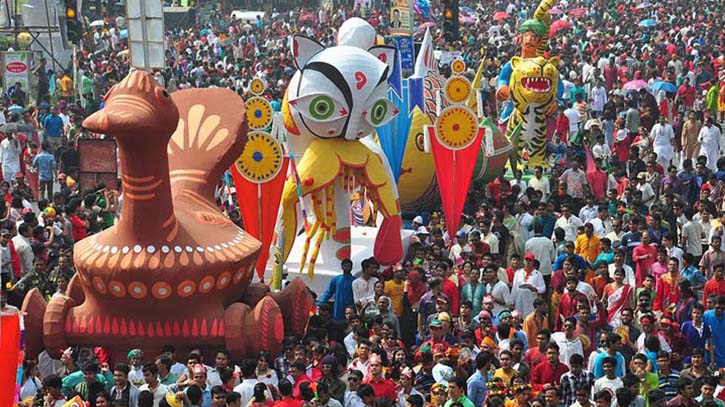Mangal Shobhajatra is a unique procession where people parade the streets with motifs and masks representing cultural heritage and contemporary events and has been celebrated on the first day of Bengali New Year in Dhaka and elsewhere.
UNESCO recognized the procession as an Intangible Cultural Heritage of Humanity in 2016.
This year, the Jamaat-controlled and Hefazat-influenced interim government, led by Prof Muhammad Yunus, renamed the mass procession by removing the word Mangal or welfare since it’s Hindu-ish.
So the new name is Borsho Boron Anondo Shobhajatra.
Radical Islamist parties, Qawmi madrasa groups, and militant groups have been demanding the cessation of the celebration for decades, terming it anti-Islamic. Militant groups JMB and HuJI-B killed many people by carrying out bomb attacks on Pohela Boisakh celebrations across the country, including the Ramna Batamul grenade blast.
The banned militant outfit Harkat-ul-Jihad al-Islami (HuJI-B) carried out a grenade attack during the Chhayanaut program at Dhaka’s Ramna Batamul, marking the Bengali New Year on April 14, 2001. The attack resulted in the deaths of up to 10 people and the injuries of over 50 others.
Hefazat-e-Islam Bangladesh is also vocal against the Mangal Shobhajatra celebrations, which include the display of idols and images of Hindu deities and various animals.
On April 10, the Qawmi madrasa-based platform said the Mangal Shobhajatra is a Hindu ritual linked to Janmashtami—the birthday of Lord Krishna—and demanded that the word Mangal be replaced with Anondo.

Hefazat also criticised what they called “secular cultural fascism” aimed at erasing Muslim cultural heritage and identity.
Renaming Hindu-ish words or names from days, events, roads and establishments is not new in Bangladesh. It’s been seen since the Pakistan period.
In the statement, Hefazat also urged the Ministry of Cultural Affairs to formally write to UNESCO, demanding a review and correction of what they called a historical misrepresentation.
To resolve the ongoing “crisis,” they proposed the reinstatement of the term Anondo Shobhajatra as a neutral, non-religious alternative. “We oppose any form of idol-worship in national celebrations,” the statement said, “especially in a Muslim-majority country where the symbols of national identity should not conflict with Islamic monotheism.”
Dhaka University press conference
“This year Bangla New Year procession has been named Borsho Boron Anondo Shobhajatra,” Dean of Fine Arts Faculty of Dhaka University (DU) Prof Azharul Islam Sheikh said at a press conference on April 11.
It reflects the country’s multi-dimensional cultural heritage, hopes and aspirations of the common people, and the liberal culture, he said.
DU Vice Chancellor Prof Niaz Ahmed Khan, pro-VCs Prof Sayema Haque Bidisha and Prof Mamun Ahmed, Treasurer Prof M Jahangir Alam and Proctor Saifuddin Ahmed attended the press conference held at the Fine Arts Faculty.
Prof Azhar said the annual practice was started in 1989 under the banner of Anondo Shobhajatra. “Later, the name was changed to Mangal Shobhajatra. So, this year’s change can be called a revival of the old name.”
The procession will start from the Fine Arts faculty at 9am. Marching through Shahbag intersection, it will go towards Shahid Minar via the Raju sculpture. From there, it will parade the roads towards Doel Chattar and Bengal Academy before culminating at the place of origin.
The motto of this year’s celebration is Noboborshoer Oikyo Taan, Fesibader Oboshan, which translates to New Year’s Unity, End of Fascism.





Leave a Reply